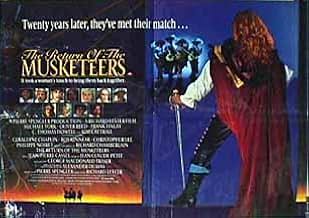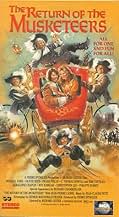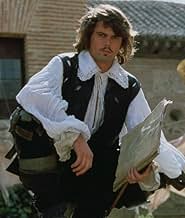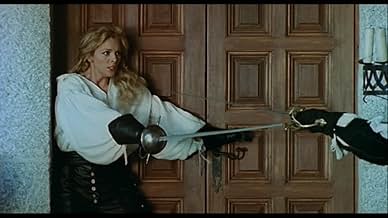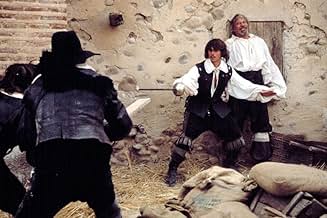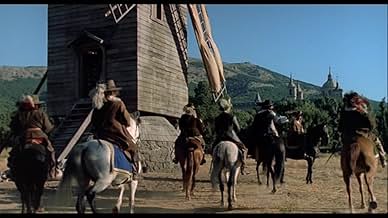IMDb RATING
5.9/10
4.1K
YOUR RATING
In France in 1649, the services of the Four Musketeers are needed again, and they run into some old foes from twenty years before.In France in 1649, the services of the Four Musketeers are needed again, and they run into some old foes from twenty years before.In France in 1649, the services of the Four Musketeers are needed again, and they run into some old foes from twenty years before.
- Director
- Writers
- Stars
Eusebio Lázaro
- Duke of Beaufort
- (as Eusebio Lazaro)
Jean-Pierre Cassel
- Cyrano de Bergerac
- (as Jean Pierre Cassel)
- Director
- Writers
- All cast & crew
- Production, box office & more at IMDbPro
Featured reviews
The Return of the Muketeers marks the reunion of the cast of the best adaptation of Dumas' novel. Here, they take up the story of the sequel, The Twenty Years After. Unfortunately, it would mark the untimely end of the life and wonderful career of actor Roy Kinnear. Ironically, the tragedy is in keeping with the darker tone of the novel.
Spoliers-D'Artagnan is still a lieutenant in the King's Musketeers, his companions having retired to estates and abbeys. D'Artagnan finds himself tasked by Cardinal Mazarin to undermine the rebellion of Beufort and the Frondists. He also finds himself the target of Milady's legacy; her evil daughter.
The film starts out a bit slow, seemingly having trouble finding its footing. It picks up when the other Musketeers enter the picture and as the film progresses. Unfortunately, the tragic accident suffered by Roy Kinnear casts a palor over the ending.
The original cast is as good now as in the original films. Philippe Noiret was a fine addition as Mazarin. Jean-Pierre Cassel returns, this time as Cyrano De Bergerac. Kim Cattrall is a mixed bag; she has some good moments, but her overall performance is lacking. C. Thomas Howell is completely forgettable as Athos' son, Raoul.
Part of the problem with this film is that Mazarin never seems as formidable as Richelieu and Cattrall is a poor caricature of Faye Dunaway. The scheming nature of Aramis is nicely illustrated by Richard Chamberlain, and Frank Finlay provides a wonderful turn as Porthos. Oliver Reed was sliding quickly into the depths of his career at this point, but he has many fine moments.
One wonders if the film would have been better without the tragedy that befell it? Certainly, it affected the actors' performances. Still, the script was a bit lacking and budgetary restraints did hurt as well. It would have been interesting to see the group tackle the final Musketeer installment, The Man in the Iron Mask. They certainly could have improved upon the Randall Wallace version. All-in-all, the film is fine entertainment for a quiet evening or a rainy weekend.
One note of trivia: Philippe Noiret would later play D'Artagnan in Bertrand Tavernier's Revenge of the Musketeers.
Spoliers-D'Artagnan is still a lieutenant in the King's Musketeers, his companions having retired to estates and abbeys. D'Artagnan finds himself tasked by Cardinal Mazarin to undermine the rebellion of Beufort and the Frondists. He also finds himself the target of Milady's legacy; her evil daughter.
The film starts out a bit slow, seemingly having trouble finding its footing. It picks up when the other Musketeers enter the picture and as the film progresses. Unfortunately, the tragic accident suffered by Roy Kinnear casts a palor over the ending.
The original cast is as good now as in the original films. Philippe Noiret was a fine addition as Mazarin. Jean-Pierre Cassel returns, this time as Cyrano De Bergerac. Kim Cattrall is a mixed bag; she has some good moments, but her overall performance is lacking. C. Thomas Howell is completely forgettable as Athos' son, Raoul.
Part of the problem with this film is that Mazarin never seems as formidable as Richelieu and Cattrall is a poor caricature of Faye Dunaway. The scheming nature of Aramis is nicely illustrated by Richard Chamberlain, and Frank Finlay provides a wonderful turn as Porthos. Oliver Reed was sliding quickly into the depths of his career at this point, but he has many fine moments.
One wonders if the film would have been better without the tragedy that befell it? Certainly, it affected the actors' performances. Still, the script was a bit lacking and budgetary restraints did hurt as well. It would have been interesting to see the group tackle the final Musketeer installment, The Man in the Iron Mask. They certainly could have improved upon the Randall Wallace version. All-in-all, the film is fine entertainment for a quiet evening or a rainy weekend.
One note of trivia: Philippe Noiret would later play D'Artagnan in Bertrand Tavernier's Revenge of the Musketeers.
It's nice to see many of the original cast members back for this third "Musketeers" movie, even though 15 years has elapsed since the second film. Usually such a long hiatus would have resulted in changes of personnel and style, but here we have a refreshing example of that NOT being the case. They even have the same director (Richard Lester), which helps to explain why the old mix of slapstick, political intrigue, sex and action is still so effective. Before I actually saw The Return Of The Musketeers, I was foolish enough to listen to all the negative critical buzz surrounding the film. As a result I came to it already prejudiced, expecting it to be a tired, listless, unworthy end to the trilogy (as many reviewers had suggested). Not so.... this is a most enjoyable instalment, and those who say otherwise are, frankly, wrong!
The musketeers as we remember them have long since gone their separate ways. D'Artagnan (perenially youthful Michael York) is the only one still employed as a musketeer, but he now works for the King - and rather less money! He is galvanised back into action when entrusted by the Cardinal Mazzarin (Phillipe Noiret) to deal with the rise of Beaufort supporters in the wake of Cromwell's rise to power in England. However, he soon has more to worry about than a mere rebellion when it becomes apparent that a name from the past has returned to exact revenge on each of the musketeers. That name is Justine de Winter, daughter of Milady de Winter (the female villain that Faye Dunaway played in the earlier films, who was eventually captured and beheaded by the musketeers). With Justine out for revenge, D'Artagnan has to track down his old friends - some of whom are Beaufort supporters and therefore the very people he should be fighting against - and together they ride again into various adventures and dangers.
There are certainly some problems with The Return Of The Musketeers, but none of them undermine the film as much as its detractors would have us believe. Firstly, Kim Cattrall plays Justine in too contemporary a style and this jars with the film's period trappings. Secondly, Richard Chamberlain's character, the musketeer Aramis, is not in the story much and the scripters have tried to compensate for his absence by introducing the character of Raoul, son of Athos. Alas, Raoul is both unnecessary to the story (he was mentioned in the book, but not used whatsoever as a key figure) and rather poorly played by C. Thomas Howell - another actor too contemporary for the surroundings. Apart from that, this is a most enjoyable movie with plenty of exciting sequences and good humour. In particular, there are several action sequences which are given a lovely element of slapstick (check out the wonderfully funny opening sequence, for example). The plot is quite complex and hard to keep up with - as, indeed, it was in the two earlier instalments - but the lively pacing and frequent bursts of action keep the audience engrossed. Many reviewers have already commented that this was Roy Kinnear's last film (he died following a horse-riding accident on the set), so I won't add too much to what has already been said. I will, however, say that Kinnear's performance in the film is comedy at its finest and this whole film is a lovely tribute to a lovely man and his considerable comic talents.
The musketeers as we remember them have long since gone their separate ways. D'Artagnan (perenially youthful Michael York) is the only one still employed as a musketeer, but he now works for the King - and rather less money! He is galvanised back into action when entrusted by the Cardinal Mazzarin (Phillipe Noiret) to deal with the rise of Beaufort supporters in the wake of Cromwell's rise to power in England. However, he soon has more to worry about than a mere rebellion when it becomes apparent that a name from the past has returned to exact revenge on each of the musketeers. That name is Justine de Winter, daughter of Milady de Winter (the female villain that Faye Dunaway played in the earlier films, who was eventually captured and beheaded by the musketeers). With Justine out for revenge, D'Artagnan has to track down his old friends - some of whom are Beaufort supporters and therefore the very people he should be fighting against - and together they ride again into various adventures and dangers.
There are certainly some problems with The Return Of The Musketeers, but none of them undermine the film as much as its detractors would have us believe. Firstly, Kim Cattrall plays Justine in too contemporary a style and this jars with the film's period trappings. Secondly, Richard Chamberlain's character, the musketeer Aramis, is not in the story much and the scripters have tried to compensate for his absence by introducing the character of Raoul, son of Athos. Alas, Raoul is both unnecessary to the story (he was mentioned in the book, but not used whatsoever as a key figure) and rather poorly played by C. Thomas Howell - another actor too contemporary for the surroundings. Apart from that, this is a most enjoyable movie with plenty of exciting sequences and good humour. In particular, there are several action sequences which are given a lovely element of slapstick (check out the wonderfully funny opening sequence, for example). The plot is quite complex and hard to keep up with - as, indeed, it was in the two earlier instalments - but the lively pacing and frequent bursts of action keep the audience engrossed. Many reviewers have already commented that this was Roy Kinnear's last film (he died following a horse-riding accident on the set), so I won't add too much to what has already been said. I will, however, say that Kinnear's performance in the film is comedy at its finest and this whole film is a lovely tribute to a lovely man and his considerable comic talents.
To be honest, though I have not watched them in ages, I am not quite as much a fan of Richard Lester's revisionist version(s) of Alexandre Dumas' swashbuckling saga as I would like (being more partial to the 1948 version which is the one I grew up with); with this in mind, I did not actively seek out to catch up with the belated third entry, neither when it opened in local theaters nor on its sporadic Italian TV appearances! That said, having purchased Anchor Bay's SE DVD set of the 1973/4 adaptations regardless, I also made it a point to finally acquire the film under review
and, though I have been wanting to check it out for the longest time, only got to it now jointly in tribute to James Whale (by way of his definitive 1939 version of THE MAN IN THE IRON MASK) and as part of my current Easter epic marathon!
To cut a long story short, I quite enjoyed the film (though the comedy is still very much frenzied and hit-and-miss in the traditional Lester style) – which had been thoroughly ignored at the time, another reason I was in no special hurry to watch it. Of course, Lester re-acquired the services of most of the principals save, obviously, for the ones who had expired or been replaced (Faye Dunaway and Charlton Heston respectively: amusingly, when the latter wished there was some way to bring Cardinal Richelieu back, the director obliged by having a portrait of him in character hung up in his replacement Mazarin's office throughout the film and which he later donated to the actor!). Still, Jean-Pierre Cassel exchanges roles from the French royal to that of nasally-deformed poet/buffoon Cyrano De Bergerac; incidentally, he had previously 'met' this other popular literary figure – reincarnated by Jose' Ferrer after his 1950 Oscar win! – when himself playing the Musketeer D'Artagnan in an obscure but worthwhile 1963 film by Abel Gance!
The new recruits, however, also proved surprisingly effective: Philip Noiret as Cardinal Mazarin, Prime Minister and Regent in lieu of the child King Louis XIV (though his openly carrying on a relationship with Geraldine Chaplin's Queen Mother is rather in poor taste!); C. Thomas Howell as the adopted son of Oliver Reed's Athos (the sole link to Dumas' "Le Vicomte De Bragellone" aka "The Man In The Iron Mask" – whereas the rest is an adaptation of "Twenty Years After", already solidly brought to the screen in 1952 as AT SWORD'S POINT); and Kim Cattrall as the true villainess of the piece (inevitably, we had to have one here as well), memorably introduced as an axe-wielding monk(!) catching up with the executioner who had beheaded her mother, Milady De Winter – born out of the latter's relationship with Rochefort (played once again by Christopher Lee, despite his vociferous protests over the years of having been paid for the previous outings on a two-films-for-the-price-of-one basis!) and whom she detests and humiliates for having abandoned her.
The plot finds Michael York's D'Artagnan still struggling for a court position, Oliver Reed's Athos typically raising hell under the influence (as befits the actor who passed away in Malta 10 years later during the filming of GLADIATOR {2000} following yet another massive binge in a local bar that was subsequently renamed "Ollie's Pub"!!) – however, whenever he chooses to flex his serious acting muscles, he is as commanding as any thespian, Frank Finlay as an inertly-wealthy Porthos, while Richard Chamberlain's Aramis is now confessor to Chaplin and, though relegated to a "Special Appearance" credit, he does get a reasonably meaty role as a womanizing cleric! Also on hand is Roy Kinnear as an amiably impish Planchet: unfortunately, he would himself die when thrown off a horse while shooting this, an unfortunate accident which led the director to give up film-making altogether (without wishing to pass judgment on him, this decision is in stark contrast to John Landis' essentially unruffled reaction at the even more tragic death of Vic Morrow while TWILIGHT ZONE: THE MOVIE {1983} was being made!).
Anyway, the narrative here incorporates the taking of power from British King Charles I (Chaplin's character's brother) by Oliver Cromwell – in cahoots with Mazarin and Justine De Winter! The Queen Mother dispatches the Musketeers to save him, but they hilariously fail since, having kidnapped the executioner and hiding under the gallows ostensibly to strike at the opportune moment, Cattrall deals the deadly blow herself unheralded! Earlier, the quartet of swordsmen also had found their loyalties divided when D'Artagnan and Porthos opt to serve the Cardinal, while Athos and Aramis take the side of a rather fey Duke (while escaping the unaccountably bumbling Rochefort's clutches – the latter even expires comically in an explosion aboard ship!) which an opposing faction supports. The swordplay is reasonably vigorous (despite the Musketeers showing their age), with Justine often taking them – and Howell – on all at once; her athletic exit, then, rips off Rupert Of Hentzau's from "The Prisoner Of Zenda"! In the end, the film (that, watched on a 40" screen, occasionally exhibited smudgy visuals) essentially marks the transition between the classical era of adventure films to the youth-oriented pictures prevalent today.
To cut a long story short, I quite enjoyed the film (though the comedy is still very much frenzied and hit-and-miss in the traditional Lester style) – which had been thoroughly ignored at the time, another reason I was in no special hurry to watch it. Of course, Lester re-acquired the services of most of the principals save, obviously, for the ones who had expired or been replaced (Faye Dunaway and Charlton Heston respectively: amusingly, when the latter wished there was some way to bring Cardinal Richelieu back, the director obliged by having a portrait of him in character hung up in his replacement Mazarin's office throughout the film and which he later donated to the actor!). Still, Jean-Pierre Cassel exchanges roles from the French royal to that of nasally-deformed poet/buffoon Cyrano De Bergerac; incidentally, he had previously 'met' this other popular literary figure – reincarnated by Jose' Ferrer after his 1950 Oscar win! – when himself playing the Musketeer D'Artagnan in an obscure but worthwhile 1963 film by Abel Gance!
The new recruits, however, also proved surprisingly effective: Philip Noiret as Cardinal Mazarin, Prime Minister and Regent in lieu of the child King Louis XIV (though his openly carrying on a relationship with Geraldine Chaplin's Queen Mother is rather in poor taste!); C. Thomas Howell as the adopted son of Oliver Reed's Athos (the sole link to Dumas' "Le Vicomte De Bragellone" aka "The Man In The Iron Mask" – whereas the rest is an adaptation of "Twenty Years After", already solidly brought to the screen in 1952 as AT SWORD'S POINT); and Kim Cattrall as the true villainess of the piece (inevitably, we had to have one here as well), memorably introduced as an axe-wielding monk(!) catching up with the executioner who had beheaded her mother, Milady De Winter – born out of the latter's relationship with Rochefort (played once again by Christopher Lee, despite his vociferous protests over the years of having been paid for the previous outings on a two-films-for-the-price-of-one basis!) and whom she detests and humiliates for having abandoned her.
The plot finds Michael York's D'Artagnan still struggling for a court position, Oliver Reed's Athos typically raising hell under the influence (as befits the actor who passed away in Malta 10 years later during the filming of GLADIATOR {2000} following yet another massive binge in a local bar that was subsequently renamed "Ollie's Pub"!!) – however, whenever he chooses to flex his serious acting muscles, he is as commanding as any thespian, Frank Finlay as an inertly-wealthy Porthos, while Richard Chamberlain's Aramis is now confessor to Chaplin and, though relegated to a "Special Appearance" credit, he does get a reasonably meaty role as a womanizing cleric! Also on hand is Roy Kinnear as an amiably impish Planchet: unfortunately, he would himself die when thrown off a horse while shooting this, an unfortunate accident which led the director to give up film-making altogether (without wishing to pass judgment on him, this decision is in stark contrast to John Landis' essentially unruffled reaction at the even more tragic death of Vic Morrow while TWILIGHT ZONE: THE MOVIE {1983} was being made!).
Anyway, the narrative here incorporates the taking of power from British King Charles I (Chaplin's character's brother) by Oliver Cromwell – in cahoots with Mazarin and Justine De Winter! The Queen Mother dispatches the Musketeers to save him, but they hilariously fail since, having kidnapped the executioner and hiding under the gallows ostensibly to strike at the opportune moment, Cattrall deals the deadly blow herself unheralded! Earlier, the quartet of swordsmen also had found their loyalties divided when D'Artagnan and Porthos opt to serve the Cardinal, while Athos and Aramis take the side of a rather fey Duke (while escaping the unaccountably bumbling Rochefort's clutches – the latter even expires comically in an explosion aboard ship!) which an opposing faction supports. The swordplay is reasonably vigorous (despite the Musketeers showing their age), with Justine often taking them – and Howell – on all at once; her athletic exit, then, rips off Rupert Of Hentzau's from "The Prisoner Of Zenda"! In the end, the film (that, watched on a 40" screen, occasionally exhibited smudgy visuals) essentially marks the transition between the classical era of adventure films to the youth-oriented pictures prevalent today.
This fun instalment of the Musketeers series (fifteen years after 'The Four Musketeers' was released) reunites the original four cast members (Michael York still looking impossibly young as D'Artagnan, now in the King's army; Oliver Reed on good form as Athos, now with a weedy son Raoul (C Thomas Howell) who really doesn't need to be there; Frank Finlay in a very silly wig as Porthos and still accident prone; and Richard Chamberlain as Aramis, now an Abbe and the Queen's confessor, but ready (eventually) to join in the swordsplay).
Kim Cattrall appears as Justine de Winter, daughter of Milady, and is completely inadequate. Making a return are Christopher Lee as Rochefort, and Roy Kinnear (who died during filming) as long-suffering servant Planchet; and fine additions to the cast include Alan Howard as Oliver Cromwell, Bill Paterson as Charles I, Jean-Pierre Cassell as Cyrano de Bergerac (an idiot who thinks geese will help him fly in a balloon to the moon) and Philippe Noiret as Mazarin.
Is it as good as the 1970s instalments, also directed by Lester? The sword fights are there (and also an hilarious scene involving trapdoors in the rooms of Justine de Winter); there's the usual set of stunts and slapstick; and there's the darker sections - Athos remembering Milady, the execution of Charles I, the young French king imprisoned in the Tower, the gunpowder-laden ship.
For me the cast member who is most memorable (as in the earlier films) is Oliver Reed, in a perfect part which gives him chance to get lots of references to alcohol in there (in one bit son Raoul offers him tea 'a new infusion', which Athos sprays out after a swig when being told there's no alcohol in it!), has him stuck in a castle window, and plummeting into a water tank from the punctured balloon. Aside from the funny bits, he's at home with the serious stuff too - proving yet again that he could act when he wanted to.
There's lots in 'Return of the Musketeers' to brighten your day and it was great to see the boys back for one last fling.
Kim Cattrall appears as Justine de Winter, daughter of Milady, and is completely inadequate. Making a return are Christopher Lee as Rochefort, and Roy Kinnear (who died during filming) as long-suffering servant Planchet; and fine additions to the cast include Alan Howard as Oliver Cromwell, Bill Paterson as Charles I, Jean-Pierre Cassell as Cyrano de Bergerac (an idiot who thinks geese will help him fly in a balloon to the moon) and Philippe Noiret as Mazarin.
Is it as good as the 1970s instalments, also directed by Lester? The sword fights are there (and also an hilarious scene involving trapdoors in the rooms of Justine de Winter); there's the usual set of stunts and slapstick; and there's the darker sections - Athos remembering Milady, the execution of Charles I, the young French king imprisoned in the Tower, the gunpowder-laden ship.
For me the cast member who is most memorable (as in the earlier films) is Oliver Reed, in a perfect part which gives him chance to get lots of references to alcohol in there (in one bit son Raoul offers him tea 'a new infusion', which Athos sprays out after a swig when being told there's no alcohol in it!), has him stuck in a castle window, and plummeting into a water tank from the punctured balloon. Aside from the funny bits, he's at home with the serious stuff too - proving yet again that he could act when he wanted to.
There's lots in 'Return of the Musketeers' to brighten your day and it was great to see the boys back for one last fling.
Lester's musketeer films were some of the first films I ever saw in the movie theatre, and I was entranced. Disappointingly I also saw "The Fifth Musketeer" with a different set of actors, and a different production team. Fast forward ten to fifteen years after that, and I'm channel surfing one evening when I come across some kind of period piece that happens to looks like a musketeer film on WTBS.
And it is. Complete with Michael York and gang to reprise their roles.
Huh? Wha-? "Return of the Musketeers"? How is it that I never heard of this movie? Particularly when it came out a few years before airing on Ted Turner's Superstation?
Unfortunately I only caught the final twenty minutes or so, but I knew WTBS would reair it at some point, or it'd be available on VHS somewhere. Right?
Nope.
Just like the book upon which the film was based I had to wait twenty years to get a DVD of this film, and from where? France. Fitting, if somewhat ironic given the production team. As part of a three film set I had to repurchase the original 1970's films, but at least I finally have the full set of Richard Lester's renaissance tales.
But, to the film. I like it. It's not quite as extraordinary as the first two films, but it does manage to recapture some of the atmosphere set by the previous two films. We see the decadence of the privileged aristocracy, but we don't quite see the visual juxtaposition of what was filth ridden Europe at that point in history.
I have to admit that the film feels somewhat cobbled together, but I enjoyed it all the same. As you probably already know comedic actor Roy Kinnear's life was tragically cut short working on this production, and the film is appropriately dedicated to him.
I guess the one thing that really stands out in this film is the fact that it's a relatively low budget affair. When the first musketeer films were shot the film makers had the advantage of shooting under Franco's Spain, making the production a cheap affair for en epic scale production. I guess when democracy spreads the wealth it also spreads the demand for wealth, making things more expensive, therefore reducing the scale of the action and truncating any large battle scenes. You can tell that in spite of this being an expensive production that the money just wasn't there to do proper Richard Lester justice for this third installment of the musketeer movies.
All in all I enjoyed it. As I say the production values aren't quite there. Noticeably the one real critique that I had with the second film "The Four Musketeers" was the fact that Michael Legrand's adventurous score was absent. So it is with this film. Which is a shame, because an adventurous film needs an adventurous score. Oh well.
Like I say, it's not the best film in the series, but I'm glad to finally have it in my collection, albeit on Region 2 DVD. Give it a chance if you're new. If you remember the 70's musketeer films, then give this one a spin for a small bit of remembrance.
And it is. Complete with Michael York and gang to reprise their roles.
Huh? Wha-? "Return of the Musketeers"? How is it that I never heard of this movie? Particularly when it came out a few years before airing on Ted Turner's Superstation?
Unfortunately I only caught the final twenty minutes or so, but I knew WTBS would reair it at some point, or it'd be available on VHS somewhere. Right?
Nope.
Just like the book upon which the film was based I had to wait twenty years to get a DVD of this film, and from where? France. Fitting, if somewhat ironic given the production team. As part of a three film set I had to repurchase the original 1970's films, but at least I finally have the full set of Richard Lester's renaissance tales.
But, to the film. I like it. It's not quite as extraordinary as the first two films, but it does manage to recapture some of the atmosphere set by the previous two films. We see the decadence of the privileged aristocracy, but we don't quite see the visual juxtaposition of what was filth ridden Europe at that point in history.
I have to admit that the film feels somewhat cobbled together, but I enjoyed it all the same. As you probably already know comedic actor Roy Kinnear's life was tragically cut short working on this production, and the film is appropriately dedicated to him.
I guess the one thing that really stands out in this film is the fact that it's a relatively low budget affair. When the first musketeer films were shot the film makers had the advantage of shooting under Franco's Spain, making the production a cheap affair for en epic scale production. I guess when democracy spreads the wealth it also spreads the demand for wealth, making things more expensive, therefore reducing the scale of the action and truncating any large battle scenes. You can tell that in spite of this being an expensive production that the money just wasn't there to do proper Richard Lester justice for this third installment of the musketeer movies.
All in all I enjoyed it. As I say the production values aren't quite there. Noticeably the one real critique that I had with the second film "The Four Musketeers" was the fact that Michael Legrand's adventurous score was absent. So it is with this film. Which is a shame, because an adventurous film needs an adventurous score. Oh well.
Like I say, it's not the best film in the series, but I'm glad to finally have it in my collection, albeit on Region 2 DVD. Give it a chance if you're new. If you remember the 70's musketeer films, then give this one a spin for a small bit of remembrance.
Did you know
- TriviaOn September 19, 1988, during filming in Toledo, Spain, Roy Kinnear fell from his horse, sustaining a broken pelvis. He died from a heart attack the next day at a Madrid hospital. Before the accident happened, Kinnear had constantly protested against riding the horse, because he had no experience in it. He also requested a stunt double, as he also had serious safety concerns. But since they didn't have a stunt double for his part, he was forced to ride the horse, which then led to the accident shortly afterwards. Kinnear's widow, subsequently sued the producers for negligence and wrongful death, winning significant damages and compensation.
- GoofsCromwell is portrayed as leader of the Parliamentarian ('Roundhead') Army and de facto ruler after Charles I's execution. In 1649, however, he was still only second-in-command of the Army (he would not become commander-in-chief until well over a year later, following Sir Thomas Fairfax's resignation). William Lenthall, as Speaker of the House of Commons, was the nearest thing the new English Republic had to a Head of State until Oliver Cromwell took up the reigns of power as Lord Protector in 1653.
- Quotes
Cardinal Mazarin: The people of England will permit anything - except cruelty to horses and a rise in the price of beer.
- Alternate versionsThe (2009) French DVD edition differs from the earlier UK VHS (and cinema) version. Both Philip Noiret and Jean Pierre Cassel had their voices re-dubbed in the VHS version, but here - on the English language option - their own voices are heard in English. Also several scenes are cut including the scene where D'Artangan gets his assignment from Mazarin to look up his old friends The Three Musketeers and the later scene where King Charles I is playing golf while being arrested by Oliver Cromwell's forces (likewise Michael York's narration of these scenes have been omitted).
- ConnectionsFollowed by La femme mousquetaire (2004)
- How long is The Return of the Musketeers?Powered by Alexa
Details
- Release date
- Countries of origin
- Languages
- Also known as
- The Return of the Musketeers
- Filming locations
- Production companies
- See more company credits at IMDbPro
- Runtime1 hour 42 minutes
- Color
- Sound mix
- Aspect ratio
- 1.85 : 1
Contribute to this page
Suggest an edit or add missing content

Top Gap
By what name was Le retour des mousquetaires (1989) officially released in India in English?
Answer

